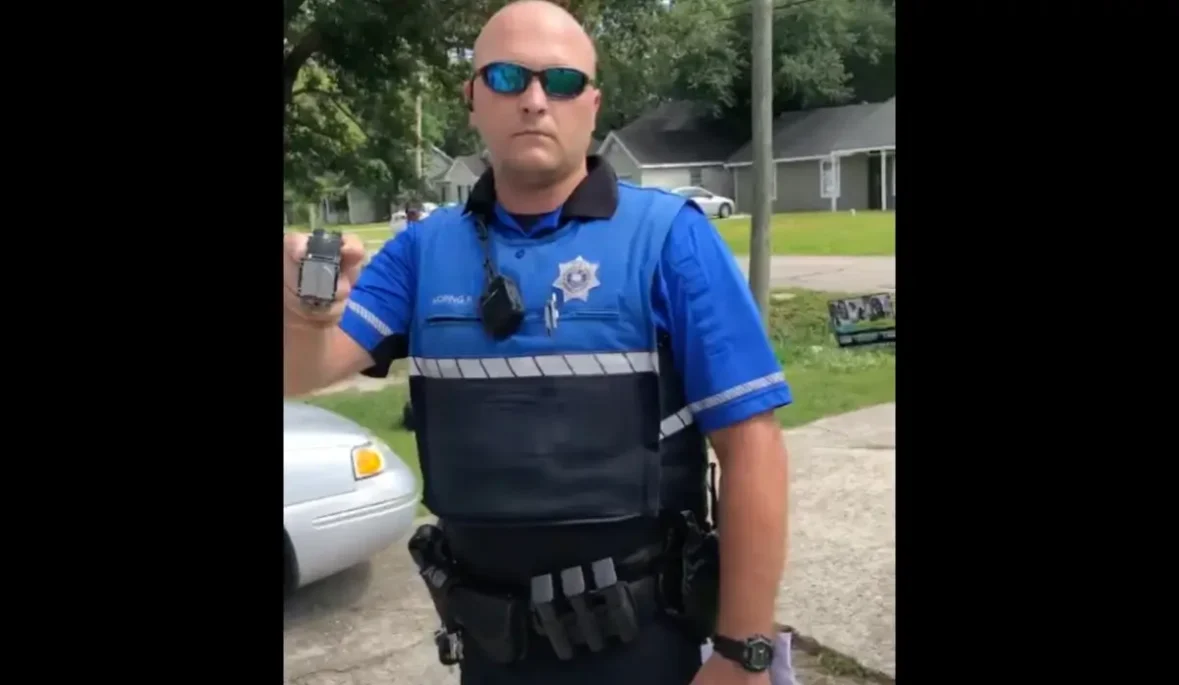‘You Cannot Tase a Child!’: A Louisiana Cop Threatened to Shock a 14-Year-Old Boy As He Filmed His Mom’s Violent Arrest. Now, Sheriff’s Office Must Pay Him $185K
A Black college-bound Louisiana teen who witnessed the violent arrest of his mother by police officers in 2020 will receive $185,000 in damages if a recent verdict in his civil rights lawsuit stands.
On May 1, a jury in the U.S. District Court for the Eastern District of Louisiana found that a deputy from the St. Tammany Parish Sheriff’s Office intentionally inflicted emotional distress on De’Shaun Johnson in 2020 while he was filming the arrest of his mother, Teliah Perkins.
Only 14 at the time, video footage shows Johnson was threatened with a Taser by Deputy Ryan Moring when he attempted to record him and fellow officer Kyle Hart manhandling his mother as she was taken into custody for a traffic violation she didn’t even commit.
Affectionately known as DJ, Johnson celebrated the ruling. He expressed his pride in his and his mother’s resilience, stating they did not back down after the Fifth Circuit Court of Appeals ruled against them in November 2023, overturning a district court ruling that found the deputies could be sued on a claim of using excessive force.
“This win means so much to me. After all these years, to finally see justice served brings me peace and joy,” Johnson said in a statement through his attorney, Keith Cohan. “I was in eighth grade when this happened to me. Now, I’m about to attend college. I’m proud of myself and my mom for refusing to accept what happened to us and for fighting for the justice we are owed.”
Cohan – a partner at Reid Collins & Tsai LLP, which worked alongside the ACLU of Louisiana’s Justice Lab to appeal last year’s ruling – echoed Johnson’s sentiments.
“There should be accountability for law enforcement officers who seek to intimidate those observing them in the line of duty. With this victory, that’s exactly what happened today,” Cohan said in a statement.
According to court documents, the incident occurred on May 5, 2020, in the driveway of the mother and son duo’s home in Slidell, Louisiana. Moring and Hart were in the area investigating a complaint about someone riding a dirt bike without a helmet.
In her complaint, Perkins said she had a motorcycle, not a dirt bike, and had not ridden it that day. According to Perkins, the deputies questioned her, and when she asked if the call could have been racially motivated due to her having neighbors she deemed racist, things took a turn for the worse.
Video footage of the arrest shows Moring and Hart handcuffing Perkins, pressing her face to the concrete, and pinning her legs with their knees while telling her to stop resisting. At one point, she yells, “You’re choking me!”
When she tells her son to record, and he obeys, Moring walks towards him, pushes him, and tells him to “Get back.” Eventually, after Johnson refuses to stop recording, Moring stands in front of him to block him while pointing his Taser at him.
“I’m a child. You cannot tase a child,” Johnson tells the officer at one point in the video. “Watch me,” Moring replies.
Perkins was originally charged with resisting a police officer with force or violence, which is a felony, and three misdemeanors, including battery of a police officer, no proof of insurance and no safety helmet.
The three-judge panel of the Fifth Circuit found no problem with the officers’ treatment of Perkins in their Nov. 30 ruling, writing, “The video evidence conclusively demonstrates that neither Deputy employed excessive force to subdue Perkins, who just as conclusively was resisting arrest.”
The panel allowed Johnson’s suit to proceed in the November decision, although Judge James Ho dissented, writing, “The Constitution does not compel police officers to affirmatively help a citizen secure the ideal camera angle while that citizen is actively berating the police just a few feet away from an active physical struggle with another person.”
According to a press release from Reid Collins, Johnson was diagnosed and treated for post-traumatic stress disorder after the incident.
The verdict came one day before a controversial bill that would make it illegal to record police officers on official duty from less than 25 feet away was overwhelmingly passed by a House committee in the Louisiana Legislature with an 8-1 vote.
House Bill 85 will now be debated in the state House of Representatives. Many civil rights activists staunchly oppose it.
Mora Ahmed, the legal director of the ACLU of Louisiana, said this fact made Johnson’s victory even more significant.
“We are thrilled to see justice served for De’Shaun,” Ahmed said in a statement. “What happened to Ms. Perkins and her son was inexcusable, and as we face imminent threats to our rights to observe police in Louisiana, it is heartening that a jury of this officer’s peers chose to hold him accountable for his misconduct.”
Suzanne Carboni, a St. Tammany Parish Sheriff’s Office spokesperson, told The New Orleans Times-Picayune it would appeal the verdict. The Sheriff’s position is the deputies took “constitutionally appropriate” actions. He labeled Johnson’s case “a meritless claim for emotional harm.”
The jury disagreed as evinced by the $185,000 they awarded in damages. The jury didn’t agree, however, that Moring violated Johnson’s First Amendment rights by preventing him from recording. All of the charges against Perkins have been dropped except one for resisting arrest, for which she was found guilty.

